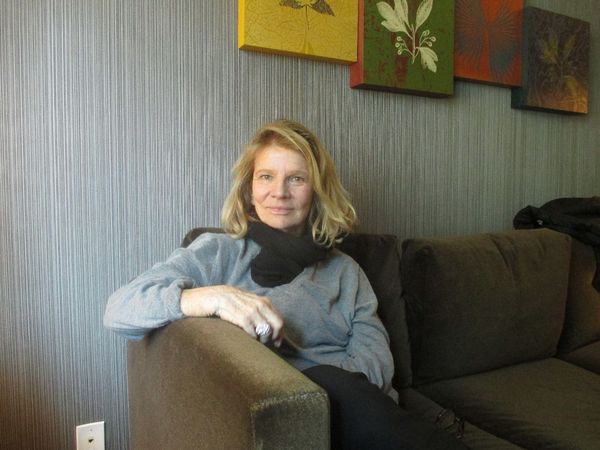 |
| Nicole Garcia to her producer Alain Attal on Milena Agus's novel Mal Di Petra: "Tell me if the rights are free or not!" Photo: Anne-Katrin Titze |
After attending the morning press preview for Agnès Varda's exhibition at Blum & Poe, organized by Olivier Renaud-Clément, I walked over to Le Parker Meridien to meet with Nicole Garcia for a conversation on From The Land Of The Moon (Mal De Pierres), co-written with Jacques Fieschi and starring Marion Cotillard, Louis Garrel and Alex Brendemühl. Shot provocatively by Christophe Beaucarne (Étienne Comar's Django, which stars Reda Kateb with Cécile de France; and Jacques Doillon's Rodin, with Vincent Lindon in the title role) with costumes by Catherine Leterrier, Garcia's film carefully chisels out something about women growing up in the 1950s, claiming themselves.
_225.jpg) |
| Marion Cotillard as Gabrielle in Mal De Pierres |
Gabrielle (Cotillard) lives with her parents and sister in the post-war French countryside. She is married off to one of the Catalan guest workers, there to help harvest lavender. José, played by Brendemühl resembles an August Sander photograph. He is as good as Cotillard in keeping us guessing what this mis-matched couple is really thinking. After Gabrielle is diagnosed with Stone Sickness she is sent to a clinic in Switzerland for a cure. This is where she meets Indochina war veteran André Sauvage (Garrel, excellent at physical suffering).
Cotillard's face oscillates mysteriously between the past depicted on the screen and a woman of the present who tries to understand. While she takes the water and falls for the alluring stranger in pain, her bricklayer husband builds her a pink house by the sea. The choice isn't hers to make.
Anne-Katrin Titze: I loved the first shot of Mal De Pierres. The skirt, Marion Cotillard's knees, and the monogram on the napkin. How did the choice come about that you wanted this to be at the very beginning of your film?
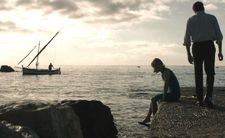 |
| Gabrielle with José (Alex Brendemühl): "I'm not sure I've ever met that kind of love." |
Nicole Garcia: I'm so happy you noticed the monogram. It's the first time that someone speaks to me of the monogram.
AKT: Because it comes back later on.
NG: It comes back! Yes, it comes back. Since I was setting out to create a movie which is very novel-like, I wanted to contain to some extent this romanesque characteristic by adding a very trivial, very mundane element. So I started off with this small car with this small family, sharing sandwiches - a very ordinary, matter-of-fact scene - before the past erupts. And creates all of the evolutions that we are going to see. So I felt in the beginning, I needed something very ordinary. With just one hint, which was indeed that monogram.
AKT: What about the novel by Milena Agus made you want to turn the story into a film?
NG: As soon as I read this book on a flight. Because a friend of mine said, "You have to read a good book", so I bought it at Orly airport and I read it on the flight between Paris and Marseille. I landed in Marseille and I called my producer [Alain Attal] and said "Tell me if the rights are free or not!" I found there was something for me in this novel. It's only the second time I did an adaptation of a book [after L'Adversaire by Emmanuel Carrère]. What I saw was a character who wanted something that everybody around her prevents her from having.
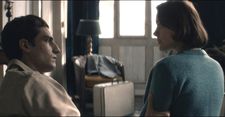 |
| André Sauvage with Gabrielle: "In terms of the Louis Garrel role, he is also part of the history of France" |
AKT: Something about her totally captivated me and I don't really know exactly why. On a very personal note, it explained something to me about my mother. Not that my mother was like her, but there is an explanation about a generation of women who came of age in the Fifties who had a desire for something that just wasn't given to them. Is that where you were going with her story?
NG: Yes! Yes! It's exactly that. It was the case for an entire generation. And in her [Gabrielle's] it's even more critical because she is a rebel and she is a sign of women that will come later, of a whole new generation. And because of that, because of being a rebel, her mother rejects her and she considers her crazy and almost threatens to lock her up in a mental asylum. Because of that there's a connection of risk in expressing desire.
AKT: Before we go further into her rebelliousness, I would like to talk a bit about the men. Both actors, I thought, were brilliant. Her husband [Alex Brendemühl - also the colonel in Comar's Django] at the wedding looks as though he came straight out of an August Sander photograph. He has a silent, connected-to-the-earth and the lavender and Spain quality to him. On the other hand, Louis Garrel is so perfect at playing pain, physical pain.
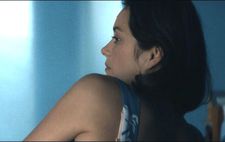 |
| Nicole Garcia on Gabrielle: "So she ends up finding herself between two men." |
NG: Physical pain, yes, yes.
AKT: Actually, I talked with him in this very room [at Le Parker Meridien] last year. He was sitting on the couch right here. Physical pain is his thing.
NG: I'm upset that Louis didn't come. I called him yesterday. I noticed he came last year. He is not reliable. An actor. Not reliable.
AKT: Can you talk about the choice for José?
NG: Yes, he [Brendemühl] is indeed a wonderful actor. But I think, as is often the case in life, it's also that he found a prefect match with this character. The character José is in itself extraordinary because one doesn't immediately understand what he is like. In the beginning, he comes off as a rough worker whereas she is dreaming of a man of culture.
AKT: Wuthering Heights?
_225.jpg) |
| Louis Garrel at Le Parker Meridien: "I called him yesterday. I noticed he came last year." Photo: Anne-Katrin Titze |
NG: Yes. And over the course of the movie, he actually reveals his immense intelligence in terms of life matters. He is probably the most novel-like character of all of them because the love he feels for her is such an unconditional kind of love. Does a love like this even exist, or not? I'm not sure I've ever met that kind of love.
AKT: To quote your dialogue back at you. Gabrielle says: "I don't love you. I never will." "I don't love you either," he [José] says in response. And then you continue with their love story. A beautiful turn on its head.
NG: They say the opposite of what they mean. There's an intrinsic matching.
AKT: He builds her a pink house by the sea! How much more can you do?
NG: A fantastic house for the location, yes. It's reality, though. Actually this is the historical truth about France in the Fifties. It's the exiled Spanish men who were anti-Franco, who fled Spain because of political reasons, who became masons and bricklayers and built half of the South of France. And in terms of the Louis Garrel role, he is also part of the history of France, the colonial history of France. Because the war in Indochina, which turned into the Vietnam war for the Americans, is indeed part of colonial history. So she ends up finding herself between two men.
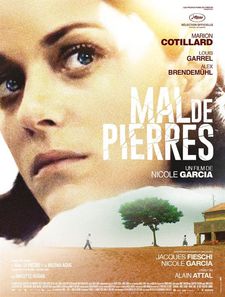 |
| Mal De Pierres poster |
Both men were part of the war. They know about death. And she is in-between the two of them. Once a woman told me in a Q&A that she felt that those men did not fear Gabrielle because they were men that had known death. They knew about war and death.
AKT: Interesting angle.
NG: The three characters are three wounded characters. The two men are literally wounded from war. She is in-between the two of them and she is wounded herself.
Coming up - Nicole Garcia on the costumes by Catherine Leterrier, working with Marion Cotillard, kidney stones, Frantz director François Ozon on choosing foreign titles, emblems of imagination, Thomas Mann's Magic Mountain, and Krzysztof Kieslowski's Dekalog.
Agnès Varda's exhibition at Blum & Poe in New York runs through April 15.
From The Land Of The Moon (Mal De Pierres), a highlight of the Rendez-Vous with French Cinema in New York, opens in the UK on June 23.





















